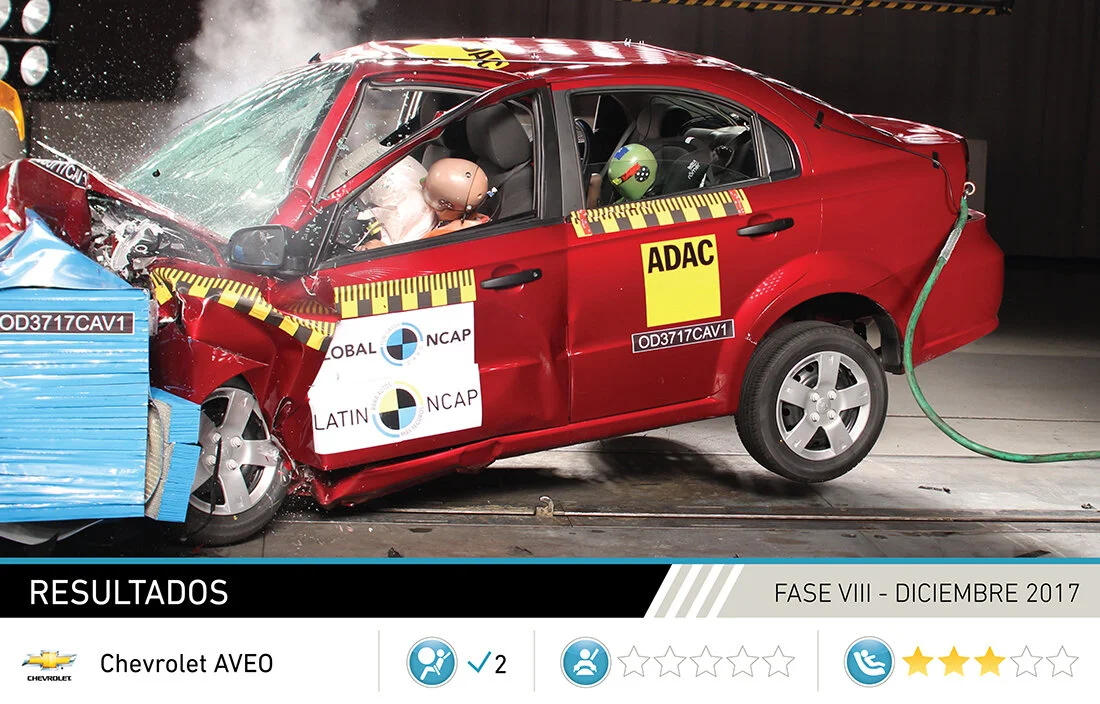Chevrolet Aveo Shows Slight Progress After Adding Two Frontal Standard Airbags
Latin NCAP’s latest results were presented today (12/12), including the Chevrolet Aveo (with two airbags), achieving zero stars for Adult Occupant Protection and three stars for Child Occupant Protection. The Aveo was previously tested by Latin NCAP in 2015, when it was the best-selling model in Mexico. At that time, the Aveo was sold without airbags in the standard version. In 2015 the model scored zero stars for Adult Occupant Protection and two stars for Child Occupant Protection, in frontal crash test at 64km/h. In that test the model showed that there was a high probability of life threatening injury to the driver which resulted in the zero stars rating.
In a positive decision, Chevrolet updated the Aveo in 2017, adding two standard frontal airbags, 3 point seatbelts in all seating positions and ISOFIX anchorages. Latin NCAP decided to test again this model after these safety improvements under the updated assessment protocols. After the frontal crash test of the 2017 Aveo a poor level of protection to the chest of the driver was recorded, even with airbags. The structural performance was rated as unstable like in the 2015 model which explains also the movement of the steering column and pedals increasing the risk of injuries in the driver.
Under the 2015 protocols the Aveo with two airbags would have achieved one star for Adult Occupant Protection with and an improved result for Child Occupant Protection of three stars. Therefore, compared to the 2015 zero stars result, there was an improvement but only to a one star Adult Occupant Protection.
As Latin NCAP rated the 2017 Aveo under the latest protocol, the model was also assessed in the side impact test achieving zero stars for Adult Occupant Protection and three stars for Child Occupant Protection. The side impact offered by the Aveo for the adult occupants is adequate to good. The adult occupant protection considering the front and side impact protection is zero stars. The Child Occupant Protection showed improvements from the 2015 model when the Child Restraint Systems (CRS) were installed using seatbelts, and in 2017 test the CRS used were installed using the ISOFIX anchorages and top tether, getting full points in dynamic test. The good dynamic performance compared to the 2015 test are explained by the use of ISOFIX anchorages and the unstable structural performance in the frontal crash that reduced the energy to the second seat rows. The points reduction came from the lack of ISOFIX marking according to Latin NCAP requirements, lack of passenger airbag disabling switch, limited instructions and failure of some CRS to properly be installed in the car.
Alejandro Furas, Secretary General of Latin NCAP said:
“Latin NCAP showed once again that just adding airbags will not make a car safe when the structure is unstable. We call for GM to bring the same safety levels offered as standard by them in other markets to Latin America very soon. The market is reacting earlier and beyond governmental requirements thanks to Latin NCAPs tests.
Latin NCAP is calling for all governments in Latin America to urgently adopt both the UN’s front and side impact crash test standards certification, electronic stability control (ESC) and Pedestrian protection requirements. While they do that we encourage local governments to make Latin NCAP tests mandatory for all cars so consumers will know the level of safety of the cars that they plan to buy”.
Chevrolet Aveo 2017
Read the full crash test report
Download the crash test video
Download crash test image
Chevrolet Aveo 2015
Read the full crash test report
Download the crash test video
About Latin NCAP
The New Car Assessment Programme for Latin America and the Caribbean, Latin NCAP, was launched in 2010 to develop a regional system of independent crashworthiness and safety rating across Latin America and Caribbean (LAC). Latin NCAP replicates similar consumer testing programmes developed over the last thirty years in North America, Europe, Asia and Australia, and which have proved to be very effective in improving the safety of motor vehicles. Since 2010 Latin NCAP has published the results of more than eighty cars in seven test phases.
Latin NCAP acknowledges the support received by the Global New Car Assessment Programme (Global NCAP), International Consumer Research and Testing (ICRT), FIA Foundation, the Inter-American Development Bank (IDB) and Bloomberg Philanthropies Global Road Safety Initiative.
Latin NCAP is an Associate member of Global NCAP and supports the United Nations Decade of Action for Road Safety 2011-2020 and the Stop the Stop the Crash Partnership.
More info: www.latinncap.com





